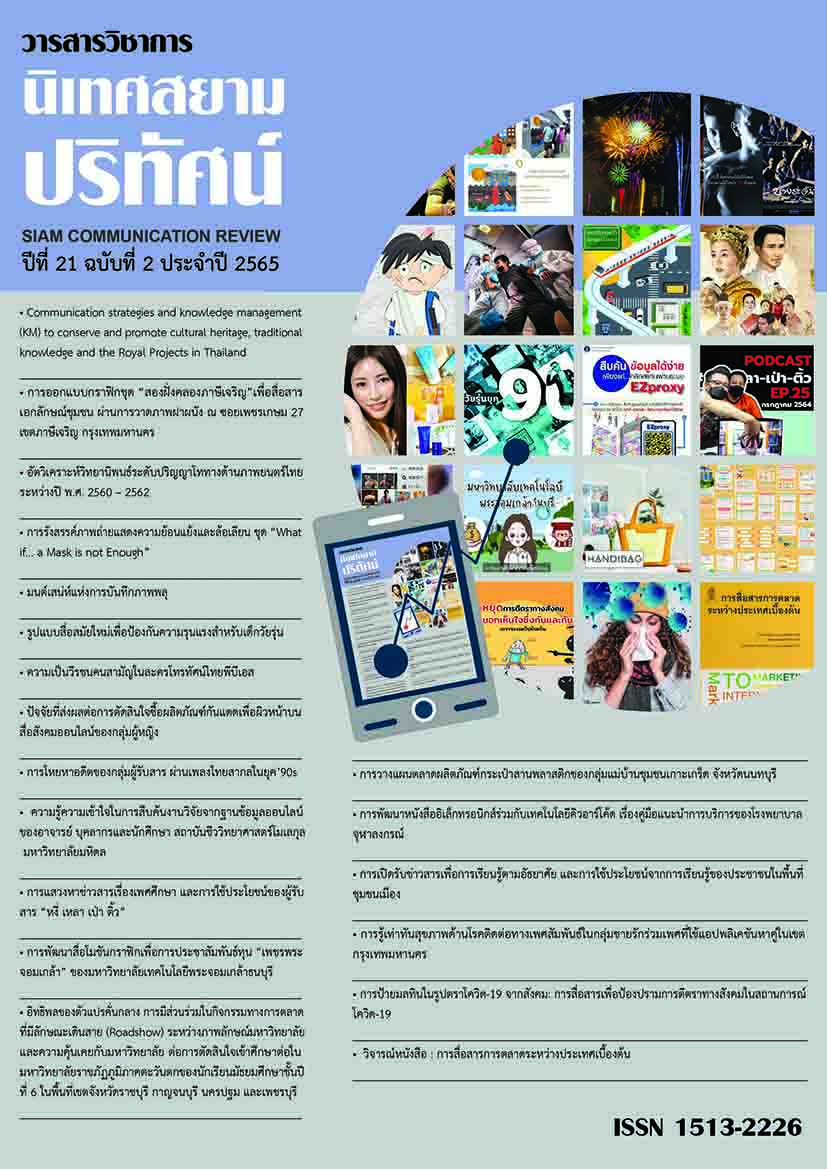Audience’s Music-evoked Nostalgia through the 90’s Thai Popular Songs
Main Article Content
Abstract
This research is designed to determine the origins and causes of the nostalgic phenomenon with the '90s Thai popular songs in Thai society, the communication behaviors expressing nostalgia and user-generated content of music audiences who prefer popular Thai songs of the 90s. The researcher uses qualitative research which consists of researching documentary sources, ethnographic study based on the researcher's experience, in-depth interviews, and participant observation by applying the concept of nostalgia, the concept of structure of feeling and the concept of user-generated content as the research framework.
The research has found that music-evoked nostalgia with ’90s Thai popular songs is originated from individual dimensions namely the many increased aging-induced roles and responsibilities that spawn nostalgia for the bygone livelihood and freedom, and social dimensions namely national situation and overall global situation that develop disheartenment dissimilarly to the past. The feelings that arise include longing for one’s past self and autobiographical memory, longing for people involved in the past, longing for social condition, longing for media exposure, and longing for the characteristics of popular Thai music in the '90s. For the audience group, these feelings are expressed through current media usage behaviors which lead to the creation of user-generated content that plays a significant role in the entertainment media production process.
Article Details

This work is licensed under a Creative Commons Attribution-NonCommercial-NoDerivatives 4.0 International License.
References
กาญจนา แก้วเทพ และ สมสุข หินวิมาน. (2551). สายธารแห่งนักคิดทฤษฎีเศรษฐศาสตร์การเมืองกับการสื่อสารศึกษา. กรุงเทพฯ: ภาพพิมพ์.
คณิตา ซองศิริ. (2553). การวิเคราะห์กระบวนการสร้างความหมายเรื่อง "การโหยหาอดีต" ในรายการปกิณกะทางโทรทัศน์ชุด "ตลาดสดสนามเป้า". วิทยานิพนธ์ปริญญามหาบัณฑิต, คณะวารสารศาสตร์ มหาวิทยาลัยธรรมศาสตร์.
จาระไน แกลโกศล. (2536). พฤติกรรมการรับฟังวิทยุของชาวกรุงเทพมหานคร. วิทยานิพนธ์ปริญญามหาบัณฑิต, คณะนิเทศศาสตร์ จุฬาลงกรณ์มหาวิทยาลัย.
ปภัสสรา ชัยวงศ์. (2557). กรอบแนวคิดเชิงทฤษฎีความสามารถในการสื่อสารระหว่างบุคลากรต่างรุ่นในองค์กรไทย. วิทยานิพนธ์ปริญญาดุษฎีบัณฑิต, คณะนิเทศศาสตร์ จุฬาลงกรณ์มหาวิทยาลัย.
พัฒนา กิติอาษา. (2546). มานุษยวิทยากับการศึกษาปรากฏการณ์โหยหาอดีตในสังคมไทยร่วมสมัย. กรุงเทพฯ: ศูนย์มานุษยวิทยาสิรินธร.
ไพพรรณ ถาวรวิสุทธิกุล. (2553) พฤติกรรมการรับฟังเพลงเก่าของผู้ฟังเยส เรดิโอ เอฟ เอ็ม 93.5 เอช ดี วัน . วิทยานิพนธ์ปริญญามหาบัณฑิต, คณะนิเทศศาสตร์ จุฬาลงกรณ์มหาวิทยาลัย.
รัชดาภรณ์ หงส์ทอง. (2556). ผลของโปรแกรมการระลึกความหลังต่อการรู้คิดของผู้สูงอายุสมองเสื่อม. วิทยานิพนธ์ปริญญามหาบัณฑิต, คณะพยาบาลศาสตร์ จุฬาลงกรณ์มหาวิทยาลัย.
วีรพล (นามปากกา). (2552). Walkman อายุครบ 30 และพฤติกรรมการฟังเพลงของคนอายุย่าง 31. นิตยสาร art 4d, 162(สิงหาคม).
สมสุข หินวิมาน. (2542). ความทรงจำใหม่กับหัวใจดวงเดิม : มายาคติความเชื่อและโลกทัศนร่วมสมัยในละครโทรทัศน์. ใน หนังสือชุดความรูโลกของสื่อ. กรุงเทพฯ: ที.พี.พริ้นท์.
สำนักงานคณะกรรมการพัฒนาการเศรษฐกิจและสังคมแห่งชาติ. สำนักงานเลขานุการของคณะกรรมการยุทธศาสตร์ชาติ. (2562). ยุทธศาสตร์ชาติ พ.ศ. 2561 - 2580 (พิมพ์ครั้งที่ 2).
Conway, M. A., & Rubin, D. C. (1993). The structure of autobiographical memories. In A. F. Collins, S. E. Gathercole, M. A. Conway, & P. E. Morris (Eds.), Theories of memory (pp. 103-137). Hove, U.K.: Erlbaum.
Dhar III, Vasant & A. Chang, Elaine. (2007). Does Chatter Matter? The Impact of User-Generated Content on Music Sales. Journal of Interactive Marketing, 23(4), 300–307.
Hall, S. (1997). The Work of Representation. In Stuart Hall (Ed.), Representation: Cultural Representations and Signify Practice. London: Sage.
Kelly, W. (1986). Rationalization and Nostalgia: Cultural Dynamics of New Middle-Class Japan. American Ethnologist, 13(4), (November, 1986), 603-618.
Schulkind, M. D., Hennis, L. K., & Rubin, D. C. (1999). Music, emotion, and autobiographical memory: They’re playing your song. Memory & Cognition, 27, 948-955·
Williams, R. (2011). The Long Revolution. Cardigan: Parthian Books.
Mian lover (นามแฝง). (2561, 25 มิถุนายน). คิดถึงยุค90sจังเลยค่ะ 1990-1999 นี่คือช่วงเวลาที่เราชอบมากที่สุดในชีวิตเลย [กระทู้สนทนา]. เข้าถึงได้จาก https://pantip.com/topic/37804745
one31. (2560, 13 พฤศจิกายน). เพลง แทงข้างหลัง...ทะลุถึงหัวใจ: เท่ห์ อุเทน | Highlight | Re-MasterThailand | 11 พ.ย. 2560 | one31 [วีดิทัศน์]. เข้าถึงได้จากhttps://www.youtube.com/watch?v=iy5Yuwlg3Io&ab_channel=one31
WorkpointOfficial. (2563, 22 มกราคม). เดอะคาสเซ็ท The Cassette | EP.1 | 21 ม.ค. 63 Full HD [วีดิทัศน์]. เข้าถึงได้จาก https://www.youtube.com/watch?v=YftjrXJZ7UE&ab_channel=WorkpointOfficial


